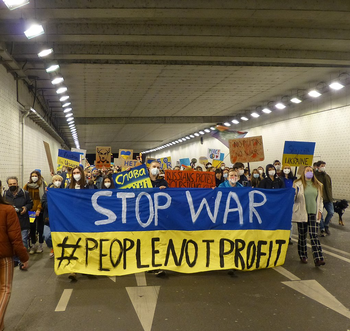Looking into Europe’s geopolitical evolution since 1989 and citing Rosa Luxemburg Heinz Bierbaum and Michael Brie explain why Russia’s war of aggression in Ukraine must be considered an inter-imperial war. Both call for the left to urgently conduct a Europe-wide debate on a concept of collective security both for Europe and its close neighbourhood. The
Looking into Europe’s geopolitical evolution since 1989 and citing Rosa Luxemburg Heinz Bierbaum and Michael Brie explain why Russia’s war of aggression in Ukraine must be considered an inter-imperial war. Both call for the left to urgently conduct a Europe-wide debate on a concept of collective security both for Europe and its close neighbourhood.
The European left is finding it extraordinarily difficult to formulate an independent peace policy under the conditions of the war in Ukraine and a new Cold War that is gaining increasing momentum. Such a policy is formulated in its own language, and this is lacking. Ferdinand Lassalle put it in a nutshell: “All great political action consists in and begins with the enunciation of what is. All political small-mindedness consists in concealing and glossing over what is.” It is time for the left to stop glossing over.
In his government declaration of 27 February 2022, German Chancellor Olaf Scholz formulated the prevailing interpretation of the war in Ukraine as follows: “With the invasion of Ukraine, Russian President Putin has cold-bloodedly launched a war of aggression — for a single reason: the freedom of Ukrainians challenges his own oppressive regime.” German and EU policy has been guided by that interpretation of the war: it resulted in the failure of negotiations in spring 2022 and escalating arms deliveries to the attacked Ukraine. The opportunities for a quick peace agreement were wasted and the disastrous path of a long-lasting war was taken.
Russia’s war of aggression became a proxy war
Leftists who, like Olaf Scholz, want to define the character of a war according to who started it are submitting to the current dominant narrative. They should bear in mind Luxemburg’s criticism of Jean Jaurès‘ thesis “Every war is criminal if it is not explicitly a defensive war”: “Here we have again, as the basis of the whole political orientation, that infamous distinction between defensive wars and wars of aggression, which used to play a major role in the foreign policy of the socialist parties, but which — after the experiences of the last decades — should be quietly shelved. What, in fact, is a defensive war? Who will undertake, with certainty, to claim that any war belongs to this or that category?” Russia’s war of aggression, which is undoubtedly a breach of international law, has become a proxy war. It has long since ceased to be about supplying aid to one who is being assaulted.
![]() The character of a war is defined essentially by which interests are politically pursued.
The character of a war is defined essentially by which interests are politically pursued.
The character of a war is not primarily determined by who started it, but rather which interests are being politically pursued in this war. And the more a war escalates, the clearer these interests become. In the meantime, it is obvious that the war in Ukraine is a war between two empires — the US-led West and Russia. It is an inter-imperial war on Ukrainian soil, turned into a slaughterhouse for the soldiers from both sides.
The character of this war becomes clear when one looks at the historical background, which is vehemently excluded in the dominant discourse, although it is the secret of this war and its driving force. The US wanted to use the collapse of the Soviet Union to establish a new “American” era of unilateral hegemony. It is this policy which is mainly responsible for the fact that, after the fall of the Soviet Union and the dissolution of the Warsaw Pact, no new security order was created in Europe and only lip service was paid to the Paris Charter of 1990. Instead, contrary to all promises, the expansion of NATO was pursued further and further eastwards. In 2008 the decision to open an accession option to Ukraine as well as to Georgia was made. The view of the Russian leadership, which saw Ukraine’s NATO membership as crossing an existential red line, was brusquely ignored. This does not justify the Russian invasion of Ukraine, but it makes it comprehensible as part of the inter-imperial confrontation in which Russia was on the defensive — economically, politically and ideologically — and which it has responded to by military means since 2008.
The war goes back a long way
While Russia’s full-scale military attack on Ukraine began on 24 February 2022, the war itself goes back further. It began in February 2014, when the attempts of the US and the EU to make Ukraine choose a one-sided orientation towards the EU and NATO, and thus abandon the policy of an in-between role between West and East. This plunged the country into a civil war in which the Russian government intervened by, among other things, incorporating Crimea into the Russian Federation and supporting the so-called People’s Republics of Donetsk and Lugansk, while the West, for its part, urged for Ukraine’s affiliation both to NATO and the EU as well as Ukraine’s rearmament.
Ultimately, the war in Ukraine is, since 2014, an inter-imperial conflict. On the part of Russia, it is about defending its threatened geopolitical position. However, on the part of the US and the EU it is exactly the opposite and is about a permanent weakening of Russia. Ideologically, this finds expression in the concept of the “rule-based international order”, which is nothing other than striving for global transatlantic dominance under changed conditions.
At the same time, the rise of China, India and other states of the global South have long since created a new reality. After a short phase of détente, which was at the same time a period of unilateral US domination, an increasing aggressiveness has emerged in the struggle for hegemony, which is related to the sharpened internal and external contradictions of uneven capitalist development.
![]() After the Warsaw Pact was dissolved, only lip service was paid to the 1990 Charter of Paris.
After the Warsaw Pact was dissolved, only lip service was paid to the 1990 Charter of Paris.
The EU states — including the German government, which was initially somewhat hesitant — are now fully committed to the mission of defending the dominance of the US and thus, as its allies, also their own privileged position. This is not only about Russia, but above all, also against China. The decisions of the last NATO summits in Brussels, in Madrid, and recently in Vilnius, are clear: China is the main systemic rival because the rise of China is incompatible with the dominance of the US. NATO also plans to become active in the Pacific. All the talk about strategic autonomy is meant to conceal the fact that the feeble attempts in this regard were already abandoned in the spring of 2022 at the latest.
Following Rosa Luxemburg, the left must always look at wars from a class perspective: whom does it benefit? The working classes are the victims. They are murdered on the battlefield and their living conditions deteriorate dramatically. It is not the oligarchs who pay the price, but the mass of the population — in Ukraine, Russia and much further beyond. The war has mutated into a “proxy war” between two empires on the soil of Ukraine. And once again what Luxemburg wrote at the beginning of World War I comes true: “The dividends rise and the proletarians fall.”
Lay down your arms immediately!
Once we understand that this war is first and foremost an inter-imperial war, then the steps towards peace also become crystal clear from a left perspective. The delivery of more and more heavy weapons represents a threat and a possibly uncontrollable escalation of this imperialist war. The slogan of left politics can only be: Lay down your arms immediately! The first step must be an immediate ceasefire without any preconditions. It should be about a ceasefire controlled by the UN and neutral states. In the second step, negotiations must be conducted to seek a balance of interests between all belligerent states and those involved in the war, building on previous agreements such as the Grain Agreement. The diplomatic initiatives recently undertaken by African states, but also previously by Brazil and China, are to be supported.
The idea that this can lead to a pre-war state of affairs is unrealistic. Thirdly, a good deal of effort is needed to create a comprehensive system of common security which includes Russia. This will take a considerable amount of time. It is to be expected that a frozen conflict will have to be endured for a very long period of time. The ceasefire would not yet be a real peace, but, as we know from many other regions of the world, it would be better than war.
Subordination of the EU to Washington’s policy
Peace requires more than just compliance with the prohibition of the use of force in international relations and the respect for the sovereignty of states. It requires, above all, a policy of common security as its basis. This is the opposite of imperialist policy, which sooner rather than later leads to imperialist wars. The left must therefore clearly reject the subordination of the security policy of the EU to the imperial claims for supremacy of the US. The left has always criticised NATO’s expansive and aggressive policy. In the meantime, doubts are being expressed about this. This is particularly true of parts of the Scandinavian left, which increasingly view NATO as a defensive alliance. Putin’s policy has contributed to this in a counterproductive way. However, NATO is not an alliance for the defence of democracy in Europe but serves the hegemonic interests of the USA. The EU’s inability to assert itself independently in terms of security policy is the cause of its subordination to NATO, which is under the leadership of the US. As it has been the case since 1948, NATO is still about securing US control over Western and Central Europe (and extending this control ever further eastwards), preventing France, Germany and the whole EU from pursuing autonomous policies, as well as excluding Russia from Europe. But the countries of the EU must guarantee their own security, democracy, and the welfare state themselves. If one looks at the wars in the geopolitical neighbourhood of the EU, it must be clear to everyone: The USA has been the main driving force behind almost all wars on the EU’s doorstep since 1991.
For all these reasons, the left has every reason to stick to its criticism of NATO. All attempts to get the military forces of EU states to engage militarily off the coast of China must be adamantly rejected.
A Cold War confrontation with China, a division of the world into blocks and a technological and economic war, as well as a surge of rearmament must be resisted at all costs. The main conflict of the present and the future is not between “democracies” and “autocracies”, not between representatives of a “rule- and value-based order” and “revisionist powers”, but between the efforts of the US to maintain its own imperial supremacy together with its allies and the attempt of many states of the world to move towards a multipolar non-imperial order of common security. Only in this manner can new interimperial wars be prevented. Only in this manner, the future in terms of a peace policy can be secured.
The shortcomings of the left
However, the European left has so far failed to substantiate and develop its demand for an alternative collective security concept for Europe. The demand for a strategic autonomy for Europe must be tackled seriously by the left. The first Conference on Security and Cooperation in Europe (CSCE) took place 50 years ago. Its objective was and still is the peaceful settlement of disputes as well as cooperation in the fields of economics, science and the environment. This can be taken up. The left should take the initiative in conducting a Europe-wide debate on a concept of collective security for Europe and the regions bordering Europe. The EU election campaign is an excellent opportunity for this. Such a concept must take into account the legitimate security needs of the EU member states and the neighbouring countries in the East, South-East and South of the EU in North Africa, the Middle East, Central Asia, and the Caucasus. Europe must at last free itself from its self-inflicted immaturity vis-à-vis the US. And the left should submit its own peace policy contribution to this.
Heinz Bierbaum is president of the Rosa Luxemburg Foundation in Berlin. Previously, he was head of the European Left Party. From 1996 to 2009, he was professor of economics at the Saarland University of Applied Sciences. Michael Brie, philosopher, was head of the Rosa Luxemburg Foundation’s Institute for Social Research and is now chairperson of its Scientific Advisory Board. This article has been first published in German on the blog die-zukunft.eu and was a contribution to the conference “Constructive Renewal Strategies” held in July 2023 at the Rosa Luxemburg Foundation.



